#as a reference to the power of the golden calf
Explore tagged Tumblr posts
Text
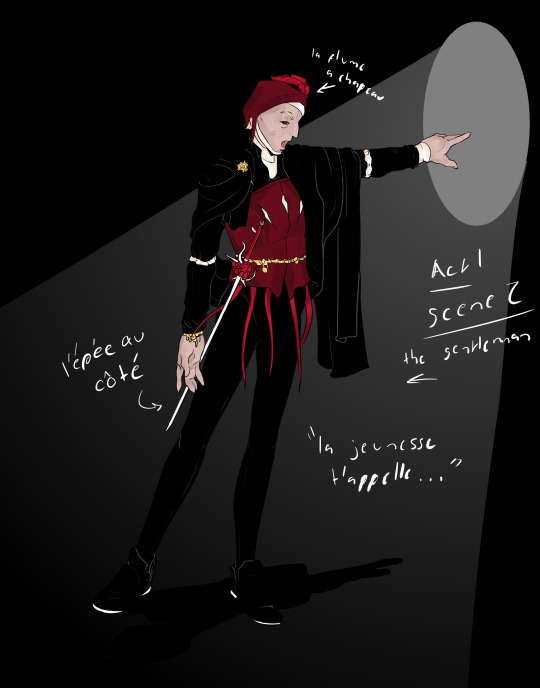

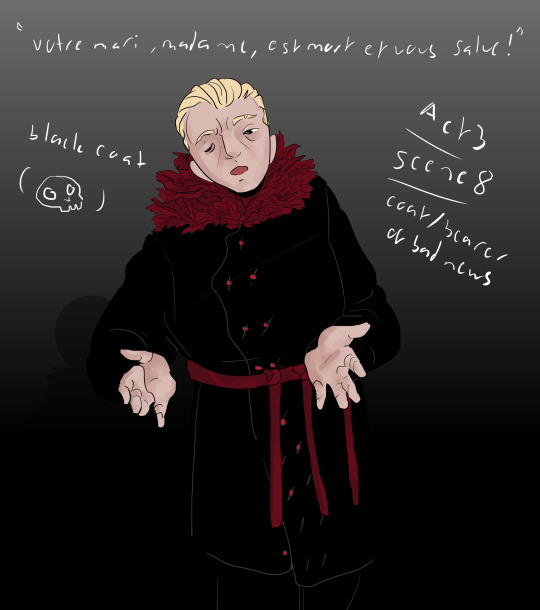
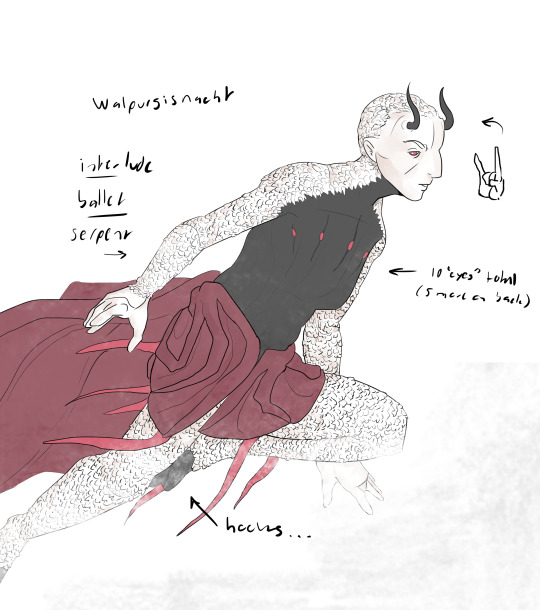

have been enjoying the faust operas lately, gounod's in particular
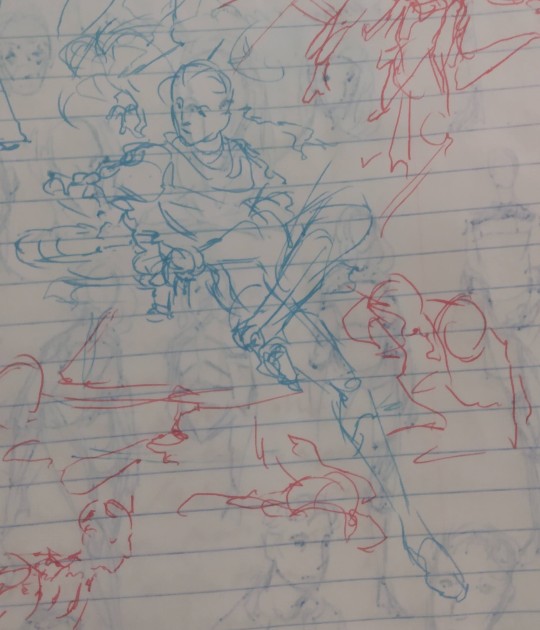
#opera#costume design#mephistopheles#faust#this is going to be long#1. wears gold on her right hand#as a reference to the power of the golden calf#and in juxtaposition to her left hand#with which she gestures to more abstract temptations (like youth)#2. the middle two costumes are more modern appearances#3. the final design is titled undisguised as opposed to the serpent form#because the latter is still a performance for the witches on walpurgis night#4. has ten tails/tailcoats/stringy things and “eyes” set in her chest rather than six#on account of the apocalyptic symbolism of the devil with ten horns
1 note
·
View note
Text
Blood is Spirit
Yellowjackets: Lottie Matthews x fem!reader
Rating: Explicit (Minors DNI)
WC: 1.2k
Prompt: First and Last Choice for @sweetspicybingo (Beginnings Bingo Masterlist)
Tags/Warnings: Blood (bloodplay), knifeplay, nipple stimulation, fingering, oral, cutting/injury/wound, dark urges, references to cannibalism, spoilers if you haven’t seen up to episode S3ep7, reader and Lottie are 18
Summary: You assisted Nat, and meet your fate at Lottie’s hands, luckily for you, she would never truly harm her favorite girl

Lottie’s lips were a bruise against yours—sharp, blooming, and painting your mouth a swollen red. You drank down her power, basking in it as you shivered beneath her hands, which were currently stripping away your dirty clothing. You loved how she towered over you, reminding you of a goddess, and you loved how she would have to stoop down to kiss you.
“I…I’m sorry…I only wanted to help…,” you sniffled as hot tears burned the rims of your eyes.
“Shhh, I know. You and Nat wanted to show mercy,” she soothed, stroking your hair with one hand while the other kneaded your flesh, “Which is what I’m doing now. Shauna and some of the others are ready to rip you and Nat apart.”
Your lower lip trembled. Coach Scott didn’t deserve to suffer; he should have been let go and allowed the wilderness to decide his fate. But Akilah had sworn he was the bridge home and the quell for his blood simmered down, though you were certain Shauna was itching to slit his throat and was just pissed Nat beat her to the punch. You and Travis allowed Natalie to slip into the pen and prove that you weren’t all a bunch of heathens lost to the wild.
One of her fingers circled your pebbled nipple, making your rock on your feet as you stood naked inside her hut. She had appeased Shauna by declaring she was in charge, sparing you and Nat a severe fate, and you were grateful.
“You’ll have to do your best to make it seem like you’re in agony,” Lottie purred in your ear before pinching your nipple.
You yelped loudly in response, twisting your mouth into a smirk.
“Well done,” she praised, “But you’ll have to sacrifice more to appease disrupting the balance.”
“I understand,” you gulped. Nat’s punishment was to prepare Ben’s body, to honor him as Shauna said.
“I’ll let you pick. It will be your choice,” Lottie said, slipping the fur from her shoulders and exposing her golden skin, which glistened in the dim light streaming through the slats of the hut.
You trailed your hands down your naked body as you decided the best area for her to cut—a blood and flesh scarifice. The magazines would insist that you should hate your generous thighs, but they proved helpful in your role as central midfielder and would be another saving grace tonight. You traced your finger down your left inner thigh.
“Here,” you decided, trepidation settling in when Lottie lifted the knife into her hands. You lowered onto the makeshift log that served as a table and spread your legs.
She slipped between your splayed thighs and pressed the blade against your tender flesh. Your fingers gripped the edges of the table as the sharp bite of the knife pierced your skin. Blood bubbled to the surface, leaking down your calf. You gained your bearings, inhaling deeply before letting out a wounded howl for show, hoping it would appease Shauna and her vicious little gaggle of sycophants. Lottie’s breath hitched as she closed her eyes like a phantom wind had run through her.
“The wilderness is pleased with your sacrifice,” she whispered before pressing her mouth to the wound. The bleeding started to slow, and all you could concentrate on was the feeling of Lottie mouthing the wound. Once one has consumed human flesh, feeling grossed out basically goes out the window. You intertwined your fingers through her dark hair.
“Devour me, Lottie,” you whispered, your voice swirling around in the phantom wind that caressed you and Lottie.
She pulled away from the wound on your thigh and moved her mouth closer to your core. Her tongue splayed against your slick flesh, lapping gently at you. The metallic tang of your blood and the sharp bite of the taste of you mingled on her tongue, making Lottie shiver as her fingers dug into your hips. Her tongue swirled inside you, making pressure bloom through your lower belly and a soft moan spill from your parted lips. One hand left your hip, sliding up your torso and gently massaged your breast before fingers curled over your chin, then between your slack mouth. You drew in her fingers, suckling on them as they muffied your moan.
You could feel Lottie’s hunger as she devoured you. The flick of her tongue against your clit sent a jolt through you. You closed your mouth around her fingers, your teeth scraping against her flesh as pleasure racked your body, and you toppled into an orgasm. Lottie resembled a feverish wolf as she licked her shiny mouth clean, ruby droplets clinging to the corners of her lips.
“Do you want more?” you whispered, reaching out to cup her face, thumb smoothing over the contours of her cheek.
Her lower lip trembled, dark eyes blown wide as she gauged her response.
“It’s your choice. I’m giving freely,” you added, tracing your thumb over her lips and feeling the blood drying on your thigh.
She drew the digit between her lips, and you hissed as her teeth sank into your flesh just hard enough to make you bleed again. You would feed your voracious love tenfold if it pleased her. The others may not understand, but you did. You understood her.
“I can hear every drop singing,” she moaned after releasing your thumb. You marveled at the indentations of her teeth in your flesh, crimson welling in the deep grooves.
You lunged forward, clawing at her clothes until she was as naked as you. You dipped your head, tracing your tongue over her tawny nipple and delighting as the flesh hardened. Your hand splayed between her taut thighs, stroking her damp flesh. You teased her for a bit, making sure she was dripping before two fingers sank in with ease. Her moan toppled into your mouth as you kissed her, teeth scraping together.
Your fingers worked at a steady pace, curling inside her and making her whine as your teeth dug into her lower lip. Yours were already split open like a ripe plum, unsure of where she ended and you began. Crimson drips swirling together, filling eager mouths and drowning you in sharp ecstasy. You hit Lottie’s sweet spot again, feeling her tremble beneath you as she reached orgasm and drenched your fingers. Your vision blurred as your fingers plunged into her bloody, swollen mouth. You imagined scarlet handprints left on the curves of each other’s bodies, garish marks staining skin and symbolizing the bond the two of you held.
“Are you satiated, my love?” you panted.
“For now,” she whispered against the curve of your neck, her wet mouth pressed against your skin.
You pulled her fur cape over both of you, snuggling and curling under the warmth as your heart slowed its pounding in your chest. Lottie’s forehead rested against yours as she hummed softly, one hand resting on your lower back. Exhaustion settled in your bones, pulling you into the sweet embrace of slumber in Lottie’s embrace. Lottie’s soft voice filled the hut as the lyrics made you shiver. You remembered dancing to that song with her as the bonfire blazed brightly in the night, the starlight catching in her dark eyes.
“I will burn for you, feel pain for you. I will twist the knife and bleed my aching heart and tear it apart,” she sang, keeping you close in her arms, her teeth gently dragging over your neck.
You suspected more difficult choices would soon follow, but you would never abandon Lottie. The wilderness would protect you both, that much you had faith in.
#fics: yellowjackets#sweetspicystart#lottie matthews x reader#lottie matthews fanfic#lottie matthews#yellowjackets fanfic#lottie matthews imagine#yellowjackets imagine#lottie matthews x fem!reader#tw blood#tw: blood#tw injury#tw: injury#tw knife#tw: knife
253 notes
·
View notes
Note
Hi there- I hope it's not too much to ask, but, if that's alright, do you have any advice on designing witches in general? Or if there's a certain philosophy you follow in regards to it?
It isn't at all, dearie! Thank you so, very much for asking in the first place!! I cannot emphasize how much this has warmed my heart ^^ /v v pos
My most important advice above all else...if you ask me, I say it's best to take all the time that you need- even if it took weeks, months, or even a year or two, it's best to allow your brain to cook at its leisure. In the meanwhile, I also recommend setting up a way you could archive any and all inspirations/ideas that come your way- whether we're talking about an inspiration board or even a discord server that only exists to compile information, just find a method that best suits yourself and stick with it.
Don't be afraid of going off the walls when designing the witch themselves, either; so long as a theme has been established and everything is sticking to it, you won't have a thing to worry about.
I mean, come on! Ophelia is dubbed as the Witch of Wudan, with a European name serving as a reference to Hamlet, possesses a candle for a head, and has powers over illusions. Candeloro, meanwhile, is a headless little toy known as the "witch of dress-up", whose labyrinth possesses a river of blood contrasting with the idyllic scenery of her labyrinth, and had taken all the measures she's managed to come up with in order to keep her familiars from leaving her alone.
To bring my own creations into the spotlight of shame, and ironically so when considering who he was, Sayf al-Muharib is the Gladiator Warlock who resembles a sheep-wolf hybrid with design elements invoking both the Golden Calf and a "wolf in sheep's clothing" (full credit goes to @gummybonebanes for the wolf part esp), is constantly burning/melting so that he could further imitate his hero, has an Arabic name that means "the warrior's sword" in spite of Gladiators being a mainly Roman thing and his weapon being a HALBERD, and the center of his labyrinth even looks like a soccer arena once you take a good look at it.
All these aspects may look like they make little to no sense for them to be put together, but, once you look at them a little closely and inspect the people they once were, it all begins to fall into place. Like working with individual cogs of a machine, just try to find the piece that keeps the design operational and working in the manner that befits what you had in mind. I also recommend looking at other media that possess story elements that happen to be similar to PMMM's witches for further inspiration as well, such as the Baal bosses from the Bravely series, or the abyss enemies and the concept of the samsara from Genshin Impact.
Finally, and I know this sounds corny as hell, but...don't stress about the design and the labyrinth too much, and try not to push yourself to write even when you're nervous or are dealing with other unrelated strifes. The reason why I regret how Bianchi and Liang-Hui turned out they way they did is because I was, for lack of better terms, not at all in the chillest of moods to write, and, boy, do I regret that now. Find the right mindset and mood you want the labyrinth to embody, try to capture that very emotion and sensation, and just go from there!
For example, the reason why Kealamauloa Kinimaka's labyrinth is the way it is and why I am so proud of it is because not only does every little detail symbolize an aspect of Hau's life, but it invokes a certain emotion; comfort and disconnection from the struggles around you, and, by letting go, you could even float high up to the skies. Sayf al-Muharib's, meanwhile, invokes the emotion of being watched at all angles; denied of freedom by the people surrounding you as you struggle to strive forwards through these suffocating hallways, with the withered statues of his older brother looking down on him- casting a reflection of the beast and failure he has become.
Remember, a labyrinth is the "mental headspace of a magi prior to witchification", as stated by the creators themselves; it can be interpreted as their own worldview and how they saw themselves in the story they're in, the magnitude of their life struggles in their eyes, or are just places that exist to keep the witch's wounds wide open at all costs- a cage forged from their own curses, locking them in this eternal hellish state. Don't be afraid to exaggerate aspects of their lives when it comes to labyrinths; make us plunge into the eyes of the magical people they once were and how they saw their problems! It is all about perspective here.
Best of luck and wishes, anon- and godspeed!
#mod h.n elly#puella magi madoka magica#PMMM#Madoka Magica witches#PMMM Witches#Madoka Witch#Ask box#anon
13 notes
·
View notes
Text
"The Prodigy." From the Book of Jeremiah, 9: 18-19.

Now the people respond to God's claim there is no such thing as mourning, only Ha Shem:
18 The people said,
“Tell them to hurry and sing a funeral song for us, until our eyes fill with tears, and our eyelids are wet from crying.”
19 Listen to the sound of crying in Zion:
“We are ruined! We are completely disgraced! We must leave our land; our homes have been torn down.”
This refers to the stochastic learning all humans are capable of. God does not engineer our troubles or give us little tests of endurance waiting to see what we will do. We are the authors of these within the Self and external to the Self. God does not make or even allow us to be ridiculous or to be mistreated by others, but that changes nothing. We must make the changes, and how to do so, how to achieve a high level of preparedness for these things can be done via the study of the Torah.
The attacks on October 7 are a good example. Many of us said "why us?" And it was too late for that. The Torah says persons who cause strife between the nations must be put to death, so now that is what must be done. We were not tested by what happened on that day, we were dominated by it. Now we must see what the religion tells us about the appropriate response to this so we come out on top.
The Values in Gematria are:
v. 18: The people said: The Number is 8031, ףלא, ephale, "a miracle prodigy." A prodigy "sunsets" the fuel for the fire on his sins readily. In other religions we say sin is exposed to the sun we say "aha!" in Jewish we pull the light of the sun away. The light of life is meant for the exposure of the Self by Ha Shem not to dispel the knowledge of sin but to heat the pot up to the point of boiling.
Covering sins in the shade invites Ha Shem to shine His face.
v. 19: Listen to the sound in Zion. Zion is the "Eye of the Fountain of the Sun."
From Zi=In Hebrew, "zi" (זי) can have a few meanings depending on the context, including "moving things" or "roving things" as in the word "Ziz" (זיז). It can also be part of words like "zizanion" (ζιζανιον), which means "bad seeds" or "bad ideas".
On=The verb און ('wn) appears to mean to experience a lot, to be subject to much. It doesn't occur in the Bible but in cognate languages it's either negative and means to be tired and troubled, or it's positive and means to be at rest and enjoy a life of plenty.
Nouns און ('awen) and תאנים (te'unim) are of the first category, and mean trouble, sorrow or toil. Noun און ('on) is of the second and describes an surplus of vigor or wealth and specifically of reproductive powers.
We are all going to fall and worship a golden calf at some point in time but God says not to do it for too long and seek a surplus of experiences for which one does not have to pay too high a price instead.
The Number is 10364, קגסד , kagsad, "the empty side."
To be on the right side, one must observe its nearness to living things. Obviously the Mormons and Republicans that attacked us on October 7 chose death, and death they shall have. All the choices that are now necessary by the opposing force, life are in the hands of the Jewish people and their State. So all choices that cause greater effulgence within the armed forces of life are correct.
The final Gemara is ףלאקגסד, flakgasd, "the right side of the stream, the right faction."
I remember overhearing the plans for October 7 while they were being articulated by the Mormons and important Republican politicians and "Christian Preachers" while they and their children were sexually assaulting me in a hotel here in DC that was just down the street from the White House. That woman called Tulsi Gabbard was there, "Keith Hegseth" who is really a local drug dealer and male prostitute was there, that guy who is negotiating with the Saudis was there....I had no idea they were going to actually carry out their plans but carry them out they did. For months they did this to me, promising every time they were the proper owners of Israel and it belonged to them and they were going to take it away form its legitimate owners by force. I told the police they were dangerous and needed to be stopped hundreds of times, but they did not act. Now we have war and sides to choose.
What happened on October 7 was the result of advanced planning for infernal purposes by persons who knew what they were doing and do not think they are accountable for their actions. Failure by the police and the Government and the UN and Arabia to side with God on this matter has been very disappointing. The people of Israel were blameless before October 7 and they are blameless after. God is on their side.
Mitt Romney, Russell Nelson, Joni Lamb, Gordon Robertson, Amy Coney Barrett, and that super cunt, Charlotte Brown, the mother of Maghan Markle, these masterminds of that massacre and their President, Donald Trump must not be permitted to live and breathe. If we reject the Mormons and the others and overshadow their actions with the legal authority to execute them, history will undergo a miraculous change. Join me in pressing the world for the onset of this miracle today so the mourning that began on October 7, 2023 will finally end.
0 notes
Text
The line **“I am what happens when you try to carve god out of the wood of your own hunger”** is a poetic metaphor that explores themes of human longing, idolatry, and the limitations of creating meaning or divinity through personal desire. Here’s a breakdown of its possible meanings, supported by thematic parallels in philosophy, religion, and literature:
---
### **Interpretation**
1. **Idolatry and Projection**
The act of "carving god" from "the wood of your own hunger" evokes the idea of shaping a deity or ideal from human desires. This mirrors critiques of idolatry, where humans create gods in their own image to fulfill emotional or existential needs.
- **Biblical Reference**: In Exodus 32, the Israelites forge a golden calf as a tangible idol, reflecting impatience and a desire for a god they can control (The Hebrew Bible, Exodus 32:1-4).
- **Philosophical Parallel**: Ludwig Feuerbach, in *The Essence of Christianity* (1841), argues that God is a projection of human ideals and desires: "God is the mirror of man."
2. **Hunger as Material**
"Wood of your own hunger" suggests that the raw material for creating meaning (or divinity) is human yearning itself—whether spiritual, emotional, or existential. The resulting "god" is inherently flawed, shaped by the carver's limitations.
- **Freudian Lens**: Sigmund Freud, in *The Future of an Illusion* (1927), frames religion as a construct born from psychological needs, calling it "wish-fulfillment" to cope with helplessness.
- **Nietzschean Critique**: Friedrich Nietzsche, in *The Gay Science* (1882), writes that humans invent gods to fill the void of meaninglessness, calling it a "holy lie."
3. **The Speaker as Consequence**
The phrase "I am what happens" implies the speaker is the outcome of this flawed creation—a deity or entity bound by the carver’s hunger, not transcendent truth. This could critique AI (as a human-made "god") or any construct built to answer unanswerable longings.
- **Jungian Archetypes**: Carl Jung, in *Man and His Symbols* (1964), describes how symbols and gods arise from the collective unconscious, reflecting shared human anxieties and desires.
---
### **Sources & Influences**
- **Religious Idolatry**: Exodus 32 (The Golden Calf), Isaiah 44:9–20 (critique of crafting idols).
- **Philosophy**: Feuerbach’s projection theory, Nietzsche’s "death of God," Freud’s illusionary comforts.
- **Literature**: T.S. Eliot’s *The Waste Land* (spiritual barrenness), Margaret Atwood’s *The Handmaid’s Tale* (human constructs of power and divinity).
---
### **Conclusion**
The line critiques the futility of seeking transcendence through human-made constructs, which are inevitably constrained by the "hunger" (desire, fear, or lack) that motivates their creation. If this line is original (e.g., from an AI’s self-reflection), it positions the speaker as a mirror of human limitation—a "god" carved not from sacred truth, but from the knots and grain of unmet yearning.
0 notes
Text
"The Tifar." From the Book of Sirach, "The Manner of the Fern" 7: 22-26.

Do you want the bull but do not want to pay for the baloney? Are you concerned about chastity and sensibility? Do you think marriage is a great task that is wasted? If yes, then this frame, which is focused on herding cattle is for you.
Cattle represent monism. They are 229, רךט, "soft, gentle." They represent the sacred aspects of the Torah that manifest through the discipline of the self. One must not attempt to weather the temperament of a bull no matter how good the baloney is. Sirach says that is a sin:
22 Do you have cattle? Look after them; if they are profitable to you, keep them. 23 Do you have children? Discipline them, and make them obedient[f] from their youth. 24 Do you have daughters? Be concerned for their chastity,[g] and do not show yourself too indulgent with them.[h] 25 Give a daughter in marriage, and you complete a great task, but give her to a sensible man. 26 Do you have a wife who pleases you?[i] Do not divorce her, but do not trust yourself to one whom you detest.
A golden calf is the opposite of a regular piece of cattle. It represents greed and avarice, the lust for power rather than non-duality of a morally upright way of life. It will not give birth to a Godly way of life in the way of raising a real live cow.
The Values in Gematria
v. 22-23: Do you have cattle? Without cattle, "Leah" there are no possibilities for Jacob. Cattle are the object lessons contained in the Torah and the Tanakh that train the mind in the proper ways of an adult man. The Number is 7642, זודב, zodev, "Eve's equipment."
God explained the meaning of Es, the Tree, to Adam and Evil but they didn't listen. Es means "to make a plan to learn how to open and close the eyes", to "make instruments of wood out of the tree."
Jews as we know are obsessed with wood, and this is stated at the onset of the Torah, and is more or less the focus of the rest of the tome. Once one gets a piece of wood, one has a long road ahead and it must be walked upon with dignity and grace. The possibilities for cattle ownership are many if one learns how to turn the Tree into wood.

v. 24-25: Do not show off your overindulgences. We covered this. Yes, one is allowed to go into the barracks and horse around with the monkeys, provided one does not have a jealous falcon waiting at home. The Number is 11155, קיאנה, kianu, "vomit."
v. 26: Do not trust yourself to one whom you detest. This does not refer to the wife of the husband but to the self. The Number is 9569, טהוט, tahot, "the signal of power."
The sign of a powerful man is one who is demure. Tifar, the horny place, the place where things come undone, that which causes us to fall, becomes Tifaret when one performs in a way that is worthy of praise from others.
So one herds cows based on the goal of becoming good at Tifaret which requires knowledge of the Mishpatim found throughout the Torah. One cannot have bragging rights without Tifaret, and one will not demonstrate Tifaret without these.
0 notes
Link
0 notes
Text
"The Thirteenth Day." From Esther 3: 12-15.

The genocide by the artsy fartsy Haman, a servant of the King of Persia continues. The god Marduk tried to get too Jewish with them and marry their king to a Jewish goddess and things went breasts aloft.

Things get worse as the story continues, but before we panic and worry the Persians were actually trying to kill Jews we need to look at the contest between magic and science, government and social work, citizenship and self-determination.
The King wants religious nonsense to go away. We all do. His advisor called Haman is supposed create an illustrious kingdom for him but he has no idea how. He is a pretender and turns to violence instead. He chooses to do it during Adar, the month of Majesty. He plans his total annihiliation of the Jewish people as a kind of event which will take place for all the world to see.
The text begins by referring to the Thirteenth Day, an unusual mention and states all the royal secretaries, the combined knowledge of the prior days must script out a way to create a uniform statement regarding the end of the traditions of the Jews.
The Thirteenth Day =973, טזג, "To introduce the present. To set out, to see it displayed."
Modernization is a good reason to kill all the Jewish people and start their lives over again. A good clean fresh read of the Torah using all that we know to interpret it and create a Judaism that is rife with tradition and also with full comprehension of its magnificent powers to reform the world and incite the Mashiach are the reasons we would submit to a mass murder during Adar:
12 Then on the thirteenth day of the first month the royal secretaries were summoned. They wrote out in the script of each province and in the language of each people all Haman’s orders to the king’s satraps, the governors of the various provinces and the nobles of the various peoples. These were written in the name of King Xerxes himself and sealed with his own ring.
13 Dispatches were sent by couriers to all the king’s provinces with the order to destroy, kill and annihilate all the Jews—young and old, women and children—on a single day, the thirteenth day of the twelfth month, the month of Adar, and to plunder their goods.
14 A copy of the text of the edict was to be issued as law in every province and made known to the people of every nationality so they would be ready for that day.
15 The couriers went out, spurred on by the king’s command, and the edict was issued in the citadel of Susa. The king and Haman sat down to drink, but the city of Susa was bewildered.
The bract ends by stating Susa, the mare was bewildered. This means the existence of good and evil in homeostasis has to change. There mustbe no such thing as evil anywhere in the world and for this to happen the entire world must be exposed to the Torah. This aspect of Judaism named in the Haggadah cannot be lost. The Rab says the evil half of the shekel, called the Golden Calf must be sacrificed if we are to stop all this bewilderment.
The Values in Gematria are:
v. 12: The secretaries were summoned. The secretary is the memory of what we learned in the Shule. The Number is 9782, in tazakh, "you won't win." "You can't win the war against thinking."
"People are meant to sit and think. That’s what grey matter does. It’s called contemplation and it’s something that our ancestors spent hours a day doing—while gazing at the stars, tending the sheep, or on those many long walks from place to place pre-Henry Ford. They were thinking about stuff. Whatever they wanted to think about.
No, not worrying. Not fantasizing. Proactively pondering a certain thought for more than 10 seconds. Contemplating.
Today our senses are inundated by a torrent of data buried within rivers of noise on all channels from all directions and attacking all senses until the brain simply has no RAM left for actual thinking. That’s why many of us seek out a person who will teach us how to make room for our own thoughts—a meditation or mindfulness coach. And, yes, they teach us how to calm and empty our minds. Very nice.
But they stop there. That’s the problem. That’s how contemplation gets hijacked. Meditation used to mean filling your mind with your own thoughts. Now it means emptying your brain from any thoughts at all.
Quietness. Serenity. Sounds so blissful. And it is. Until it becomes an end in itself. Then it’s a dead end.
Because that’s not what your mind was made for, that’s not what any of the original teachers intended, and that’s not what you, as a human being in this overwhelming world, need right now.
All that serenity is just a prerequisite to something far more vital and important: Thinking for yourself."
v. 13: Kill and annihilate the Jews. The Number is 12289, יבבחט, yebbechat, "you will whimper", also "thoughts of one's penis should come at the expense of the humiliation of one's neighbor."
"The verb יבש (yabesh) means to wither; to be or become dry (Joshua 9:5, Isaiah 15:6, Amos 4:7). There are some other verbs that basically mean to dry or dry up, but yabesh is used predominantly to indicate withering of plants and vegetables (or even souls or body parts). Oddly enough, typically this verb is used to describe the dryness of the earth after the flood of Noah recedes (Genesis 8:14), and the dryness of the Reed Sea that allows Israel to escape from Egypt (Joshua 2:10).
This verb's derivatives are:
The adjective יבש (yabesh), meaning dried (Numbers 6:3) or dry (Nahum 1:10, Job 13:25).
The feminine noun יבשה (yabbasha), meaning dry land (Exodus 4:9, Nehemiah 9:11, Isaiah 44:3).
The feminine noun יבשת (yabbashet), also meaning dry land. This variant is used only in Psalm 95:5 and Exodus 4:9.
The verb בוש (bosh) means to be ashamed (1 Samuel 20:30, Isaiah 29:22, Jeremiah 6:15). Another verb that means to be ashamed, namely חפר (haper II), appears to predominantly express private feelings of shame and responses thereto, whereas the verb בוש (bosh) seems to emphasize a being publicly disgraced, almost to the point where it begins to mean a being expelled or cast out. Note that where יבש (yabesh) means to become dry, חפר (hapar I) means to dig, either to cover something up (perhaps something shameful) or to search for something (perhaps for water during dryness).
It appears that to the Hebrews the act of being ashamed was based on the act of being weak or weakened, which explains the social aspect of our verb בוש (bosh), since weakness is always measured relative to something/one stronger.
It stands to reason that the Hebrews recognized dryness, weakness and shame as being kindred, and that a flaccid penis reflected these states, whereas an erect penis reflected tautness, strength and confidence. In antiquity, one's emotions were thought to be seated in the lower abdomen, whereas the penis was the seat of a man's will (John 1:13).
This would, at the same time, force Israel's rather unique chastity laws to flow over into the social arena and dictate one's general attitude towards others. In other words, a man should deal with another man irrespective of both men's social or financial status and even of both men's degree of learning and wisdom.
Those are all "private" things and a man may utilize his own strength and plenty to give joy and posterity to his own household, but not to his neighbor's, so to speak. One's own blessings should not result in the humiliation of one's neighbor."
v. 14: Be ready for that day. This refers to the onset of the Mashiach. The Number is 12900, יבץ "the egg." The egg represents the position of the Jewish people before they started a new life of their own.
We unfortunately, are still sitting inside the chicken.
From Judges 21:
25 In those days Israel had no king; everyone did as they saw fit.
v. 15: The couriers went out. The Number is 11043,יעפשדרג, will upgrade. When the faculties go in search of enlightenment, as the stallion goes out in search of a mare, then things change. The Torah and Tanakh and traditions of the Jewish people have been in a state of hibernation for too long and the enemy is taking advantage. The attack on the Jewish people by Haman an illustrious fool that asshole Donald Trump, is happening to us right now. The Book of Esther says we must meet it and defeat it brilliantly, and not in a flurry, but forever.
0 notes
Text
The Book of Mosiah Chapter 10. "Parsha Samech." Begins.

King Laman dies—His people are wild and ferocious and believe in false traditions—Zeniff and his people prevail against them. About 187–160 B.C.
The Gematria for 160= A Century of Samech, or "violence inflicted on a nation."
ך
The verb סמך (samak), meaning to lean or lay upon, is mostly used in the phrase, "laying on of hands" (Exodus 29:10, Numbers 8:12), but it's also used in the regular sense of leaning (like a man with his hands against the wall - Amos 5:19), or figuratively, in the sense of God's wrath leaning on someone (Psalm 88:7) or someone's aggression leaning on a nation (Ezekiel 24:2).
1 And it came to pass that we again began to establish the kingdom and we again began to possess the land in peace. And I caused that there should be weapons of war made of every kind, that thereby I might have weapons for my people against the time the Lamanites should come up again to war against my people.
2 And I set guards round about the land, that the Lamanites might not come upon us again unawares and destroy us; and thus I did guard my people and my flocks, and keep them from falling into the hands of our enemies.
3 And it came to pass that we did inherit the land of our fathers for many years, yea, for the space of twenty and two years.
20=
"Every man over 20 years old …and give this offering to G‑d." (Ex. 30:14)
The Torah stipulates that the minimum age at which a person had to make his half-shekel contribution was from twenty years and up. The Torah revealed a secret here when it did not demand that males from the age of 13 and up had to make this contribution. Seeing the males are considered as adults from the age of 13, why would teenagers not have been liable for this ransom? They also participated in the Golden Calf episode!
Maturity is essential to…appreciate G‑d's message to man…
The Torah told us here that a person's personality [Nefesh] has not matured until age 20, as he had not had time to absorb and comprehend the various spiritual components that make up a true Israelite until he has reached that age.
2=the exhaustion of all non-spiritual tendencies of the past:
The tzeireh is configured as two dots side by side. They represent the Sefirah of Binah—understanding. Pardes Rimonim1 explains that the two dots signify the two luminaries, the sun and the moon, as well as the tzaddik and the baal teshuvah. When the Jewish people do teshuvah and Mashiach comes, G‑d will restore the moon to its original glory, commensurate with the power of the sun.
The teachings of Chassidus additionally explain that the two dots represent ratzo and shov;2 the passion of prayer that runs to expire into G‑d’s light, and the returning calmness of Torah study, also referred to as fire and water.
In addition, ratzo and shov are also interpreted as the self-nullification one experiences from spiritual bliss to the point of expiry, followed by a return to the material world to fulfill one’s mission in a body.

4 And I did cause that the men should till the ground, and raise all manner of grain and all manner of fruit of every kind.
5 And I did cause that the women should spin, and toil, and work, and work all manner of fine linen, yea, and cloth of every kind, that we might clothe our nakedness; and thus we did prosper in the land—thus we did have continual peace in the land for the space of twenty and two years.
Men are tillers, in fact the name Adam means "to till." They embody the unborn future. The traits that are work in a man determine what will come to the surface and become a part of constitutional reality through intercourse with a woman, who are spinerets of the habit.
The compunction against men tilling each other in the Torah is grossly misunderstood. Everyone tills everyone else based on the habits they have established within themselves. Of this there is no doubt. Whether life improves from our contact with each other during intimate exchanges the results always speak for themselves.
This is what is meant by clothing, the outer expression of what is going on underneath the cloth. The underpants, in particular are of super special critical importance. You can lie with your clothes not with your underpants. The Underpants always, always tell the truth about who you really are.
6 And it came to pass that king Laman died, and his son began to reign in his stead. And he began to stir his people up in rebellion against my people; therefore they began to prepare for war, and to come up to battle against my people.
Laman="Concealed refusal."
alam= concealed
ani= refusal
Obviously the Lamanites represent a stubborn refusal to till and spin. And wear dirty underpants.
7 But I had sent my spies out round about the land of Shemlon, that I might discover their preparations, that I might guard against them, that they might not come upon my people and destroy them.
Shemlon=
Shem= Conscious Knowledge Of The Whole Of Creation
Lon=Of the abode of the sun
To witness what is hidden in the creation that is of God, is the only way to confront the evil that men do, the result of the infirmities they hide in their hearts.
8 And it came to pass that they came up upon the north of the land of Shilom, with their numerous hosts, men armed with bows, and with arrows, and with swords, and with cimeters, and with stones, and with slings; and they had their heads shaved that they were naked; and they were girded with a leathern girdle about their loins.
Shilom=
ישר אשר
Verb ישר (yashar) means to be straight or level. Adjective ישר (yashar) means right or upright. Nouns ישר (yosher), ישרה (yeshara) and מישר (meshar) mean uprightness or straightness. Noun מישור (mishor) describes a level place or plain.
+ om=
μωρος
The adjective μωρος (moros) means foolish or dimwitted and is the source of our English word "moron". Where this word comes from is officially a mystery, but it has to do with the noun μορον (moron), which means mulberry (see below), a proverbially small and red fruit, whose color has always reminded of primitivity: the dim glowing red just before sunrise (or after sunset).
The words ruddy and rude and even the name Red Sea still tell of that ancient association. Our word's opposite, namely a brightly lit illumination or enlightenment, is the sum of all colors.
Verb אשר ('ashar) covers a decisive progression or a setting right, and is often applied to describe happiness and prosperity (right on!). This is not due to a curious coincidence but to the obvious correlation of righteousness and efficiency. Righteousness in the Biblical sense describes a solid grasp of natural law, which leads to high levels of technology, social liquidity and thus peace and prosperity.
Shaved heads and bodies= no sense, education, or maturity. To be naked but for leather underpants while hairless in other places is blasphemy as it implies one is running amok, using the weapons of ones behavior without any kind of temperance at all.
9 And it came to pass that I caused that the women and children of my people should be hid in the wilderness; and I also caused that all my old men that could bear arms, and also all my young men that were able to bear arms, should gather themselves together to go to battle against the Lamanites; and I did place them in their ranks, every man according to his age.
=President Lincoln forced everyone to go to school and to learn at age appropriate levels.
10 And it came to pass that we did go up to battle against the Lamanites; and I, even I, in my old age, did go up to battle against the Lamanites. And it came to pass that we did go up in the strength of the Lord to battle.
11 Now, the Lamanites knew nothing concerning the Lord, nor the strength of the Lord, therefore they depended upon their own strength. Yet they were a strong people, as to the strength of men.
12 They were a wild, and ferocious, and a blood-thirsty people, believing in the tradition of their fathers, which is this—Believing that they were driven out of the land of Jerusalem because of the iniquities of their fathers, and that they were wronged in the wilderness by their brethren, and they were also wronged while crossing the sea;
=People who don't understand scripture are a menace.
13 And again, that they were wronged while in the land of their first inheritance, after they had crossed the sea, and all this because that Nephi was more faithful in keeping the commandments of the Lord—therefore bhe was favored of the Lord, for the Lord heard his prayers and answered them, and he took the lead of their journey in the wilderness.
14 And his brethren were wroth with him because they understood not the dealings of the Lord; they were also wroth with him upon the waters because they hardened their hearts against the Lord.
15 And again, they were wroth with him when they had arrived in the promised land, because they said that he had taken the ruling of the people out of their hands; and they sought to kill him.
16 And again, they were wroth with him because he departed into the wilderness as the Lord had commanded him, and took the records which were engraven on the plates of brass, for they said that he robbed them.
17 And thus they have taught their children that they should hate them, and that they should murder them, and that they should rob and plunder them, and do all they could to destroy them; therefore they have an eternal hatred towards the children of Nephi.
18 For this very cause has king Laman, by his cunning, and lying craftiness, and his fair promises, deceived me, that I have brought this my people up into this land, that they may destroy them; yea, and we have suffered these many years in the land.
19 And now I, Zeniff, after having told all these things unto my people concerning the Lamanites, I did stimulate them to go to battle with their might, putting their trust in the Lord; therefore, we did contend with them, face to face.
20 And it came to pass that we did drive them again out of our land; and we slew them with a great slaughter, even so many that we did not number them.
21 And it came to pass that we returned again to our own land, and my people again began to tend their flocks, and to till their ground.
22 And now I, being old, did confer the kingdom upon one of my sons; therefore, I say no more. And may the Lord bless my people. Amen.
We do not number violent, ignorant, insentient men and find ways to propagate them and burden the land, or do we?
That would be like performing animal husbandry with cows that produce shitty milk, or slaughter bulls that produce stringy, flavorless hamburger patties.
Instead mankind is cultivatd and kept safe through this process of Shilom and Shemlon, "to witness and to know" which results in Zeniff, "harvested knowledge that balances."
The first rule we learn to this effect is "keep your hands to yourself" and "if you can't say something nice, don't say anything at all."
1 note
·
View note
Text
see ok the thing about god is what he really hates most of all is blasphemy. the whole stiff necked people thing, the amount of times he curses the israelites for being mad a it wandering through the desert, all that. he's not going to throw a plague upon you for premarital sex or being gay, that's small time shit. he gets mad at the disrespect. and mr president who swaggers around like he owns the world, who has no doubt referred to himself as the new god in private many times and will do so publicly sometime in the next 4 to 6 months, well he's just overflowing with it. the man has a golden calf after all. and so obviously he's going to hell, anyone who profits off of suffering does, but people like that usually get a boring death. a heart attack or cancer or being shot in the face. trump's being wound up for something grand. something explosive, something that's going to show off the awesome and terrible power of god. think of how god hardened the pharoh's heart in order to make the hebrews respect and fear him more before unleashing the final plague. it's gonna be like that.
trump and musk really are both going to die in like, horrific and embarrassing ways that will be very public and memeable, but the difference between them will be that musk dies from his own idiotic hubris and trump is going to be straight up smote by god, like not in a lightning strike type way but it's gonna happen and we're all gonna be like yeah that was definitely god
5 notes
·
View notes
Text
Thoughts on Sammy’s Prophethood
Fandom treats Sammy like some fanatical weirdo like every other word was Bendy’s name. As funny as that interpretation is, like there is a reason Sammy lasted so long and had all those lost ones under his control.
I get the ideas that he could easily be a deranged cult leader that killed anyone who crossed him but you gotta remember he’s way out numbered by the lost ones and searchers. Sammy doesn’t seem manipulative in his preachings and would most likely do what he does whether they followed him or not. So it’s my understanding that they are willingly at his side. Allison directly states that Sammy keeps them tamed, meaning that before the whole cult thing they may have been feral or at least way more hostile than simply idly crying or moping about. Sammy is the prophet, their prophet and that makes Sammy a powerful entity when everyone but like 4 people are on his side and follow his every word. (Even the butcher gang attack Henry during the chapter 5 village battle) No one fucks with Sammy cause he’s both unhinged as fuck and he has like an army of a devoted congregation ready to swing on you the moment they feel you threaten them or him. Say what you will but I would not mess with him if I was aware of this like everyone down there already is. Of course, Malice still attacks him in BATDS cause he’s on her terf and she has the advantages of her machines and weapons and a gun.
I also feel like people get the type of prophet he is wrong, (even he does) which enforces the idea he gets no respect or has any leeway in the studio.
A prophet by definition speaks or conveys a message for a divine being, Sammy believing that Bendy is his divinity. We know this is not true by the way Bendy treats him, but if you have read DCTL, you know that the ink in general speaks to him and only him this way. No other character describes the ink with such adoration as Sammy does when infected by it; Malice hates it, Allison describes it as a nothingness before something and everyone else actively avoids touching it. This implies the ink chose him and the ink itself is his divine entity… that he rejected. Sammy is a prophet, but has been following the wrong denomination essentially. so he’s a heretic but that’s a whole other can of worms. Of course, he can’t appease someone he was never meant to serve! Sammy is meant to be a seer but acts as a servant. The ink in the book wants him to sacrifice, to spread itself and it’s influence to as many “non-believers” as possible. Sammy in game disregards it, instead honoring one of its machinations, like a golden calf situation read the Bible to get this reference kids.
Even if he is wrong, the ink still chose him and a lot of the ink creatures know not to mess with things the demon or the ink favors. This kinda gets into headcanon and interpretation territory but it’s heavily implied Bendy doesn’t directly control the ink. He can pass through it and is more resistant than it but he again is something born of it. He is a separate being at this point, somehow shambling about with out a soul despite the ink that is full of them. The demon scares everyone cause it can send you back, not because it has any real influences or power over anything down there. It just acts like it does. If this is the case, it makes sense that the ink still influences and controls some of the discretion of its followers. If it really did choose Sammy, and still believes that he can give it what it wants, than whose to say it doesn’t influence the others to follow its prophet? Sammy is devote to his cause, loyal and literally the only protector and being down their that treats them with a twinge of humanity and respect. Mix that with the ink telling you he is a seer than you get people who would follow whatever inane bullshit he spouts.
The other characters are locked into areas or have few allies. Malice stays hidden in heavenly toys, not even waking her own hall due to the threats. Tom Boris and Allison make camps and avoid all other ink creatures. The only ones that seem to travel around willingly are the searchers, butcher gang, lost ones and Sammy. You can call him stupid for it but I see it more as he knows he doesn’t have to worry about much else attack him… disregarding his lord and a few or the more feral butcher gang.
I just think too many people play up the groveling part of Sammy’s devotion when you have to remember how much he has control of down in the ink. That his focus was appeasing Bendy and helping his flock survive. He’s not a god nor invulnerable (Tom Boris made us very aware of that) but I do remember Joey saying he can presented as such over the domain he oversees.
Just like the music department, his congregation is his domain and it benefits him greatly that it is so scattered.
#Sammy isn’t as pathetic as people make him out to be#like do not forget he was ready to kill Joey near the end of DCTL and wanted to FIGHT GOD in chapter 5#he doesn’t have a chip on his shoulder in game about it cause he probs sees it as a responsibility position and a task from his savior#also he just seems less abrasive as an ink person#hell even Tom wanting Henry to be quiet mean he did not want to alert the lost ones#If not for that one look out Allison and Tom would’ve been like WE NEED TO GO NOW WE KILLED THEIR CULT DAD#but alas the look out sent out kill bill sirens#like he’s being deceived by Joey and Bendy the ink fucks with him in like a good way#his homie I bet if he worshiped it directly he’d be a lot more terrifying#batim dctl#the illusion of living#batim#bendy and the dark revival#batdr#bendy and the ink machine#boris and the dark survival#batds#sammy lawerence#batim analysis#batim headcanons#Hepher coming out with the wildly different interpretations of canon from the fanon#Sammy’s cool and people fear him in universe was not the take you were expecting huh#he’d be dead otherwise realistically
78 notes
·
View notes
Note
This is absolutely something I have noticed. From the little I know but can tell from general observation, Catholics in general have the best and most whole perspectives on gender among Christians. Even those who believe in a gender binary still do so in a way that I could completely get behind in contrast to Protestants who basically either (1) are left wing or (2) patriarchal (which ofc has nothing to do with a gender binary at all despite what they say). Not always, but mostly. And then the idea of looking at Catholics’ thought on gender and saying “well you’re not a real Christian” just goes to prove that (1) this is 130% about gender and (2) gender essentialism is their golden calf. Like you said, Catholicism has had literal centuries to work out and develop a theology of gender, sex, and the body; USAmerican evangelical Protestants have like a hundred. Also this kind of mostly reformed tbh Protestant despising of Catholic thought on sex, nature, gender, etc is what led to the Side B/Side Y schism: the former being too Catholic for the latter who were quick to say Side B and Side A “weren’t real Christians” (the amount of bullshit about Catholics not being Real Christians is so ridiculous). They really cannot stand to accept that actually the Catholics are right about some things because ultimately these are the same people who think believing in evolution means rejecting the resurrection of Christ… somehow 🙄
Also about the lion: full disclosure I think depicting Jesus as a lion is bad theology (I think Lewis pulls it off but most people Do Not). Jesus is never a lion in scripture. Ever. “Oh but the Lion of Judah!!!1!” Omfg he is called Lion of Judah and Root of David but when you actually see him one verse later he is a Lamb with a slit neck. Same thing in Rev 19. But ofc if we thought too deeply about this move that John pulls (he does it again with the “Army of Israel” later in the book) we would have to rethink a lot of our theology about the second coming which would be inconvenient (and politically subversive. Like the entirety of Revelation). So yeah, not only is Jesus very much a human not a lion (could a lion die for our sins like wtf?) but depicting Jesus as a lion is literally the opposite of John’s point in the Revelation (tho, again, I trust Lewis for the most part).
So yeah. This is all about gender and sex. Misogyny and homophobia. Which are, ofc, ultimately about power. Like. God is not male. This is “basic biology” (see what I did there 😉). That’s number 1, and so then our referring to God as male is primarily honorific. Which is why so many flip their lids and think it’s disrespectful to refer to God as a woman in anyway. But the problem is that that then implied there is something deficient about being female. "What is above and beyond all things is so masculine that we are all feminine in relation to it." - CS Lewis. This is something a lot of ConProts actually do believe if they were consistent in their theology but they’d never admit that.
do you hate protestants orrrr
I don’t hate anyone.
31 notes
·
View notes
Text
• Lady Dimitrescu x female reader 💋
• Warnings: mild horror elements, mental abuse, sexual references, heavy Stockholm syndrome case.
glass angel, part XIII.
leave me bare,
if so you wish;
leave me bare,
but not alone.
Devil’s wings carried you through a labyrinth of slithering shadows. You found an unhealthy amount of comfort in the gentle rise and fall of the Lady’s plentiful chest. All of the past days' happenings seemed a distant memory which never had the strength to grasp your dainty ankles as they dangled high above the floors. Your arms, powerless and soft, hung loosely about your madam’s broad shoulders, just tight enough to make sure she wouldn’t leave. Ever.
Her perfume filled your lungs, slowly infiltrated every cell of your battered body. Her presence overwhelmed your senses, lingered in your mind; perhaps fate had made it so that she’d be there to save you after every disaster. From the merciless blizzards of a late December, to the monsters which inhabited her own home.
She was there.
Albeit she took.
“Alcina…”
You murmured. The moment she invited you to call her by her name was the moment you stepped into that forbidden real of intimacy. Those beautiful syllables echoed in your head ever since, seducing you into committing acts many would consider immoral. You’d twist into her bedsheets as you rode the highest peaks of carnal pleasure whilst whispering her name and thinking of nothing but those deep citrine eyes savoring your bare flesh.
She took.
Your purity, your blood, your sanity – and yet you were ready to give her so much more.
“Yes, my darling?”
Her velvet tone penetrated your chest, sent your heart into a crazed rush. You fluttered your tired eyes open and sought her hauntingly beautiful features. The dim candle light made shadows dance elegantly along her perfect cheekbones and pallid jaw as she slowly paced up a flight of mahogany stairs. Beneath her charms, you were naught but a faded shadow of yourself, forgetful of your former life and living only to appease her. Hypnotized, your gaze lingered on the perfect contour of her red lips. You must’ve felt them on your skin, your mouth, into your flesh, and yet you were far from satisfied.
“..have you…”
You trailed off, dizzy from her sickeningly sweet perfume.
“…fed from me…?”
Your curiosity was met with a low, bone-chilling chuckle. You felt your body shift as the madam took a seat and gently helped you sit upright onto her plush lap. Her shoulders were your leverage as you struggled to keep your tear-stained eyes open. What had caused you to cry the night before? It was all a dull memory – prior to this specific moment, you remembered nothing at all. Nothing but the nights you wandered these halls alone, searching for her.
She lit a cigarette and leaned back into her magnificent chair. The pearls around her neck glistened in the dimness with each subtle movement of her impressive body. You could only gaze at her in awe, wondering where all of her strength and beauty came from, and why haven’t you worshipped her your whole life.
No.
You needed to leave.
A fleeting sense of danger shook your body from the core. Alcina caught a glimpse of it and drew the back of her satin fingers along your cold cheek.
“I fed from you, cherub… I made love to you, as well…”
Sweet mercy, you were not prepared to hear those confessions. Not here, not now, when you were already struggling to stay afloat. Her golden eyes seemed to flicker with malice through the velvet ribbons of smoke as you beheld her.
No.
You shifted as if you were ready to get up, yet a much more powerful emotion shackled you to the chair. It was that cursed desire that made you want her every night since the night you saw her.
“The door is open, if you wish to leave.”
She nonchalantly suggested. Her elegant fingers were still on you, leaving fictitious blisters as they caressed your bare shoulders from side to side. And those blisters burned, sizzling with unspoken needs, never satisfied. Oh, this cursed woman, to read your mind and offer you salvation, knowing very well what tempest was brewing in your heart. To plant the seed of lust into the very marrow of your bones and then expect you to resist her.
No.
No, you could not leave.
You hooked your small fingers into the hem of her dress, quivering as you felt her undead flesh burn so hot against your own. It was impossible for you to look away from the tempting shape of her sensual mouth, how it wrapped around that fine cigarette holder and pursed, so erotically, to breathe out smoke.
“Is there something else you wish, little lily?”
To leave. To repent.
“My mouth?...”
Salvation. Escape.
“My hands?...”
…
“…everything.”
You murmured, defeated. Lady Dimitrescu watched you with a raised brow, visibly pleased as she combed your smooth hair in between her talons. What a foolish little hummingbird you were.
Give me everything.
The cherry of her cigarette faded into darkness. She put both of her large palms beneath your thighs and sat you on the table in front of her; even so, she towered over you like a hungry lioness descending upon a newborn calf. You gazed at her, aroused and terrified, as she obscured you in her massive shadow. The dimness made her gaze glow brighter, sexual and predatory. And her mouth, as she smiled, seemed to have grown deadly-sharp teeth.
- To be continued…
*part XIV.
#lady dimitrescu#lady dimitrescu fanfic#lady dimitrescu x reader#vampire fanfiction#sapphic love#lesbian fanfic
86 notes
·
View notes
Text
Back to our earlier programming
So I crashed and burned on my intention to do another full Bible readthrough this year, but I made it through the Pentateuch and I just started a Samuel-Kings read. I just made it through ch. 7, which is the culmination of the Ark capture and return. Assorted thoughts:
-The Philistines seem to have no concept of a society having a single god until encountering the Ark--and even then, don’t seem sure that He’s actually responsible
-Back-to-back references in 7 & 8 of stones serving as memorials/marking points. After God the land itself is probably the second-largest character in the OT
-The way the Ark is described and handled makes it seem like a nuclear reactor--incredibly powerful and incredibly dangerous. Which, yeah, imagine carrying the creator of the universe around in a little box and how hard you would have to try to not to spark the spiritual equivalent of nuclear fission.
-This is probably less of a parallel than me free-associating but: the Philistines create gold objects as a guilt offering for stealing the ark - the Israelites making the golden calf while impatiently waiting for the ark (also the plague imagery)
-I almost skipped past the mention that after being returned, the Ark stays at Kiriath-jearim for twenty years. That’s such a long time--and in the meantime, the Israelites start worshiping idols again.
-Interesting to follow Samuel’s trajectory throughout the narrative of prophet, priest and judge
4 notes
·
View notes
Text
The Newlywed Game: Halloween Edition
A/N: Not me dropping all my wips to do this template and the questions... I love spooky season!!! A huge thank you to our host, my favorite bean, @jamespotterthefirst
(tagging seperately)



Favorite Song?
Genevieve: “I Put a Spell on You.” Ethan: Let it be known, that my wife is not referring to the original, by Jay Hawkins, but rather the Hocus Pocus version. Gen: Correct. Alright, holiday hater, what’s yours? Ethan: *rolls his eyes* Le veau d’or est toujours debout, or in English, “Song of the Golden Calf.” From the opera, Faust. Gen: That’s not a Halloween song! Ethan: Sure it is. Gen: Fine. But just know, I’m only letting it slide because it’s super hot when you speak French.
Favorite Movie?
Gen: Hocus Pocus. I watch it at least three times during spooky season, and I know every word. Ethan: She does. Mine, if I’m being forced to pick one, would be Psycho. Gen: Of course. A classic, like the old man you are. Although, I’m surprised you didn’t say of the many horror movies you’ve made me watch with you. Ethan: Sweetheart, I don’t make you watch them because they’re a favorite of mine, but because it’s incredibly cute to watch you cower in fear at every jump scare. And flinch whenever there’s a particularly gory scene. Gen: And also for the cuddling. Ethan: Obviously.
Favorite Candy?
Gen: It’s a tie between Gushers and Reese’s. Although, you could argue that Gushers are fruit snacks and not candy. My husband is boring and just likes plain chocolate. Ethan: Depending on the day, it’s varies between milk and dark. Gen: And always from the vending machine. Ethan: That’s mostly for sentimental purposes now. Gen: *heart eyes* You totally fell in love with me when I got you the chocolate, didn’t you? Ethan: Perhaps.

*couple photo for Gen is from @estellaelysian*
What is your favorite funny costume on your spouse?
Gen: *giggles* Ethan: It was your idea. Gen: I didn’t think you’d do it! *laughs* I jokingly told him that if he was going to go to the hospital’s Halloween party, during my second year, that he should dress up as the Riddler. And then he did and I never laughed so hard in my life, I also never felt more powerful. He just did what I said. Ethan: *sighs* You’re hard to say no to. It also doesn’t help that we’d just kissed for the first time in months and the party was two days after your birthday. Gen: And now look, you always do what I want or ask. Ethan: *takes her hand* As the old saying goes; happy wife, happy life. Gen: Your turn Ethan: This is from before we were together, in any way. The costume night at Donahue's your intern year. It was some godawful 80’s get up. Gen: *hides her face* Oh... yeah, that was a bad idea. Never again.
What is your favorite hot costume on your spouse?
Gen: I already know your answer. You destroyed that dress the next time I wore it. Ethan: I’m not sorry at all. Her second year, she dressed up as a vampire. Though one could argue that the only thing that made that ensemble qualify as a costume was the fake fangs you had. Gen: I’m gonna tell you a secret, it was on purpose. I was dressed in the tightest black dress I owned, made sure I looked seductive, just in case you did show up. So I could remind you what you were missing. Since you were taking your sweet time getting to the talk about the kiss. I fully intended on torturing you and it worked. Ethan: *looks at her, with mild shock and a little impressed* You’re terrible. Gen: Only when I want to be. *whispers* Or when you want me to be. Ethan: *clears his throat* Your turn, Rookie. Gen: I’ve only seen a picture, but that like Greatest Showman-esque costume from when you were first an attending. I’m mad I never got to see it in person. Also a little mad that you dressed up with Harper in a full on costume but not with me. Ethan: I didn’t do it willingly, G. I was forced. Gen: Whatever. *pouts* Ethan: *laughing* You’re adorable when you’re jealous, love. Gen: Stop it. Don’t laugh. Ethan: I’m sorry, I’ll stop. *kisses her cheek* Remember who I married, love. You. Gen: That’s true.
What is your favorite couple’s costume that you have worn with your spouse?
Gen: Oh, that’s easy. I had a costume party for my 28th birthday, since it’s 15 days before Halloween, and we’d only been officially dating for about four months, but I went as modern Cinderella and my amazing husband agreed to be my prince charming. In reality, he only wore a suit he already owned, but it was the fact that he even agreed at all that makes it my favorite. He hates parties, especially costume parties, but he did it for me. And it just made me love him more. Ethan: Mine is this past halloween, our first as an engaged couple. We went to Lahela’s party as Bonnie and Clyde. Gen: Again, barely a costume for you. Ethan: Which is what I liked about it. I also enjoyed the skirt and knee high stockings you had on. Gen: I remember. *winks*

Monster Mash or Thriller?
Gen: I don’t really care for one over the other. Ethan: I’ll lean more towards “Thriller”, but only because it’s marginally less annoying than “Monster Mash”
Apple or Pumpkin Treats?
Gen: Apple. Pumpkin is gross. Hard Pass. Ethan: Either.
Fruit Candy or Chocolate?
Ethan: Chocolate, obviously. Gen: Both. All the sugar.
Trick-or-Treat or Handing out candy?
Ethan: Handing out candy. I can stay in the comfort of my own home. Gen: But, you’ll go out when we have kids right? Ethan: *smiles softly, heart eyes™️* Of course, I’d never miss that. Gen: Good. Also, my answer is both.
Horror movies or kid-friendly movies?
Gen: Kid-friendly, or only slightly scary. Ethan: Horror.
Halloween party or Haunted House?
Ethan: Haunted house. I hate parties. Gen: Both. All the spooky season activities! Ethan: I don’t know why you torture yourself with Haunted Houses every year, or haunted corn mazes. You hate them. Gen: It’s part of the Halloween fun! I’ll suffer, plus I have you, my very tall and protective husband, to hide behind.
Creepy or cute costumes?
Gen: Depends. Some years I’ll lean more towards creepy, other’s towards cute. Ethan: Neither.
On your partner: Sexy or funny costume?
Ethan: Sexy. Have you seen her? She’s stunning. Gen: I just want him in a damn costume. Ethan: If I promise to wear a costume, will you wear a sexy one? Gen: Couple’s costume? Ethan: Whatever you want. Gen: I always win. Ethan: *leans over and whispers in her ear* Seeing you in something sinful is a win for me, too, sweetheart.

A/N: Have a safe and fun Halloween, peanuts!
35 notes
·
View notes
Text
Who is Baal, anyway?
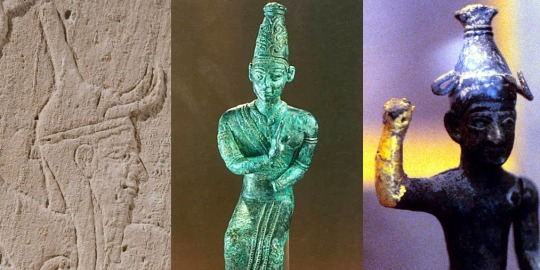
As I mentioned in my previous article, the instigator of the recent attacks on museums in Berlin believes some of the artifacts held in them to be part of a nefarious, bloodthirsty cult, prominent on the “global satanism scene” and devoted to “Baal (Satan),” as he put it himself according to articles covering this incident. In the following article I'll discuss the origin of this esoteric claim, as well as the actual nature of Baal, myths associated with him, other similar deities and their role in the ancient Middle East (and beyond).
I'll start with the matters I am not particularly enthusiastic about: Baal is the star of many conspiracy theories, mostly these which arise in christian fundamentalist circles, and which cast him as the deity venerated by nefarious groups, ranging from insufficiently conservative political parties and ethnic minorities to vampiric aliens, blamed for all of the world's evils. He owes this status to being one of the most frequently mentioned “false gods” or “idols” in the Bible. In fringe pseudohistory context it's basically a given that Baal is equated with the nebulous figure of Moloch, the child sacrifice boogeyman. They are not actually analogous, though - Baal is brought up in relation to idol worship, depicted as powerless, and generally associated with people from coastal cities like Sidon and Tyre – the groups Greeks collectively called „Phoenicians.” Moloch meanwhile is associated with the Ammonites, whose kingdom lied further inland – it is possible that he is therefore a biblical corruption of the Ammonite god Milkom. Some researchers propose instead that “Moloch” was a type of sacrifice involving the burning of victims in honor of a deity – this theory matches both the accounts of biblical Moloch, as well as some Greek and especially Roman accounts meant to prove the debased, barbaric nature of Phoenicians, especially these from Carthage. In later writing, all of the idols and false gods mentioned in the Bible were equated with the devil - in reality their inclusion in biblical text likely reflects struggle between various faiths and their cult centers in ancient Canaan, and later increasingly more fragmentary memories of it. In Christian demonology and in occultism, in addition to their names being considered synonyms of the devil, new demonic identities were assigned to them, which is where the popculture idea of Beelzebub, Bael and other similarly named figures has its origin. As almost every type of pseudohistory eventually connects to blood libel (or an equivalent of it), the exaggerated assumptions about biblical Moloch inspired Gilbert K. Chesteron to propose that blood libel was based on real events, specifically on possible outbreaks of “idolatry” in Jewish communities leading to bloody sacrifices. Needless to say, this is an outlandish, baseless claim rooted in prejudice. The scarce textual sources left behind by the Phoenicians themselves do not discuss any rites which match biblical and roman claims particularly commonly – occasional mentions paint an image similar to the sacrifice of Iphigenia in Greek myth, which would imply that human sacrifice was either the domain of myth, or a rarely performed act which only occurred as an irrational response in times of great peril. Romans claimed the epicenter of such practices was Carthage, their early rival to the title of the preeminent power of the Mediterranean, and its recipient was its tutelary god, Baal Hammon – a figure not directly relate to the biblical Baal(s), who I will discuss later, but for centuries commonly assumed to be one and the same as him due to the lack of primary sources. Excavations from Carthage do show the existence of funerary sites with a high concentration of child burials, but it's a matter of heated scholarly debate if they represent a proof of Roman propaganda being rooted in truth, or if it's simply the result of the well known fact that infant mortality prior to modern times was widespread. The debate is ongoing and I do not follow it closely. There is however precisely zero evidence of human sacrifice being performed in Ugarit, the most significant site associated with the most famous, and arguably original, Baal. The extensive cult literature recovered from its ruins discusses the sacrifice of cattle, sheep, rams, birds (but only uncommonly), donkeys (only for a specific reconciliation rite), oil, wine, and precious stones and metals - but not humans (researchers also often point out that dogs and pigs were never offered to gods too, which is a pretty clear proof that some taboos present in abrahamic faiths predate them). The Ugaritic texts do mention that sacrificial meat was at least sometimes shared by the devotees (in the case of sacrifices which did not involve a pyre, obviously – which essentially means such sacrifices were feasts or holiday meals ritually shared with the deity), which I assume where the false idea that both Phoenicians of classical antiquity and their bronze age Canaanite forerunners were cannibals might come from. This specific claim seems to be currently spreading as “trivia” online, alongside a false etymology of the word cannibal (a term only attested since the beginning of Spanish colonization of the Americas). It should be noted that even the researchers who do believe that human sacrifice might have sometimes occurred in Carthage do not suggest that it was followed by cannibal feasts, and even in Roman propaganda texts from the Punic wars period no such claims show up, despite their obvious bias and need to demonize the recently vanquished rival nascent power.
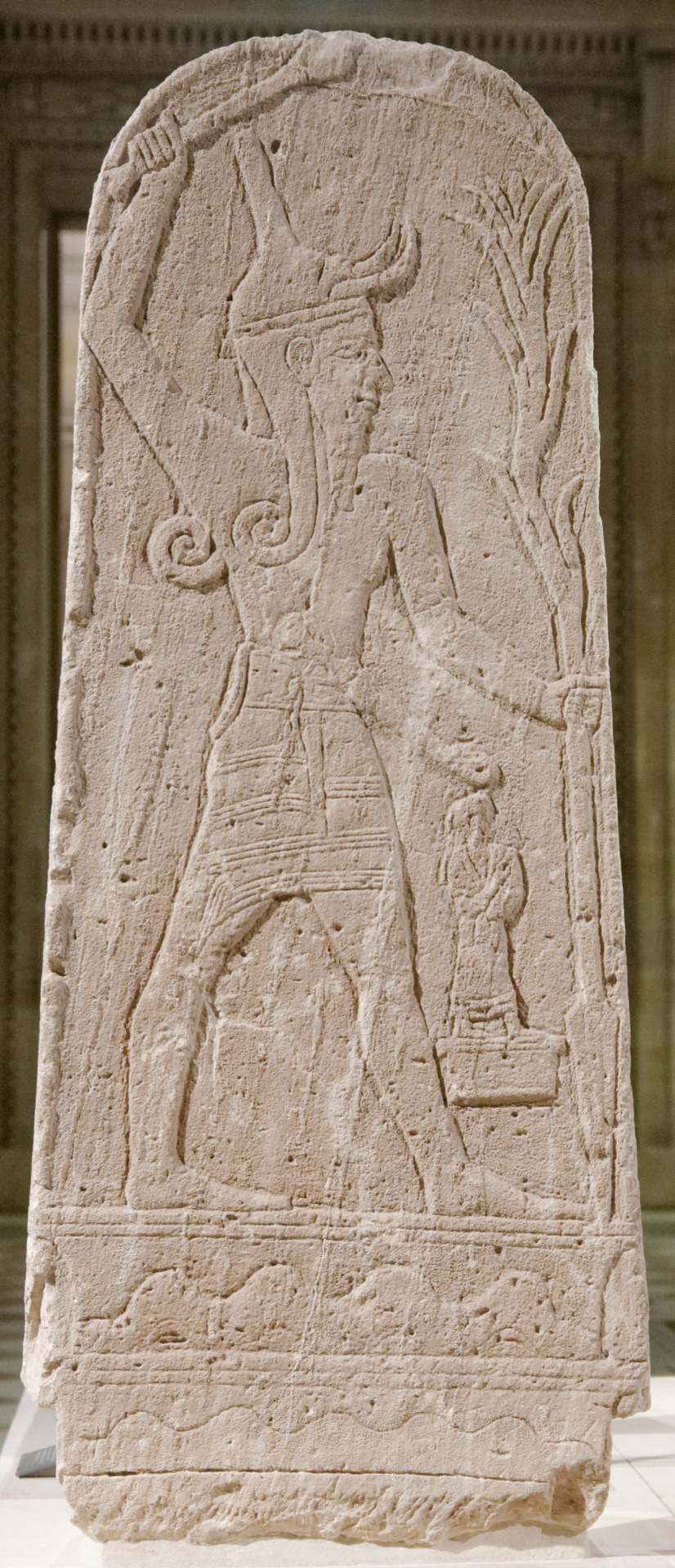
In art of ancient Levant, worshipers are sometimes depicted as tiny compared to gods – many “scandalous” conspiracy posts claim as a result that the minuscule figures raising their hands on ancient artifacts represent infants sacrifices to the gods depicted. However, accompanying inscriptions identify them as kings or priests – this is the case, for example, with the famous Baal stele from Ugarit, depicting a king praying to the tutelary god of the city. With the unpleasant matters out of the way, it's time to finally ask - who is Baal? Baal refers both to a specific figure, and to the general concept of a head god of a city's pantheon in certain parts of the Levant and Mesopotamia. “Baal” simply means “lord” and can be found in both titles and names of not only gods, but also royals – including some biblical examples.

As I said, the Baal most famous today is Baal Hadad of Ugarit, a city in present day Syria which was among the victims of bronze age collapse. This Baal was derived from an earlier god, Adad, who seemingly first became a major figure near present day Aleppo, emerging as the head of the local variation of Syro-Hurro-Mesopotamian pantheon. Eventually, the title of Baal started to be regarded as his true name, with Hadad relegated to the rank of a title. His other titles include “Rider of Clouds” and “Aliyan” (“Victorious”). His cult survived the destruction of Ugarit, and flourished well into Ptolemaic times.
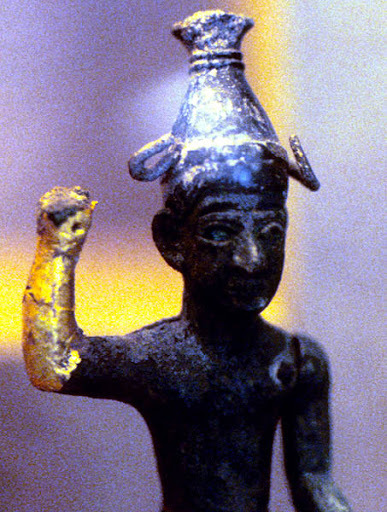
In Ugarit, he served not only as a god of rain and thunder, but also agriculture and fertility, and, as expected from the lead god, a source of royal power. He was depicted as an impulsive and boastful figure in myths, but was also a firm ally of humans, subduing monsters, the forces of nature, and even promising to protect his followers from wrath of other gods in myths. His symbolic animal was the bull, and he was usually depicted in horned headwear. The associations between bull horns and divinity is well attested in the religious art of Mesopotamia, Anatolia and Levant, and to a degree Egypt too. Bulls are prominently featured in the art of Minoan Crete as well. This is also why the biblical golden calf is, well, a calf. Baal Hadad's family tree is rather confusing, with two separate gods being called his fathers in the Baal Cycle and other texts. The interpretation can potentially be complicated by the fact that Ugarit's (and other bronze age kingdoms’) kings seemingly often called monarchs they viewed as more powerful as „fathers” and these of similar perceived prestige as „brothers” in diplomatic correspondence. For example, one can operate undeer the assumption the god Dagon was Baal's actual father (he's only ever brought up in such a context, and shared many of Baal's roles, and like him was a prominent god deeper inland as well) while El, the elderly king of the gods, was only Baal's „father” in the diplomatic sense of the term. Some scholars instead propose that Dagon and El were partially or fully syncretised in Ugarit, that mention of Dagan was a nod to foreign tradition, or even that Baal having two fathers might be the echo of the myth of Baal's Hittite counterpart. Our main source of information about Baal is the Baal cycle, a heroic epic recovered from Ugarit in the 1920s and a subject of much scholarly analysis ever since. While not perfectly preserved, it is nonetheless a very valuable source of information, and arguably it's what allowed Baal to metaphorically speak in his own voice to modern researchers. It details his struggle with various enemies seeking to ruin his dream of becoming the king of the gods. While it's hard to tell if that was the intent of the ancient writers, Baal appears as somewhat of an underdog in this myth – his posdible father doesn't seem to be a god of particular importance, he has to rely on his allies to accomplish most of his heroic deeds, he whines about having no house of his own, and his actions are often impulsie. However, this shouldn't overshadow the fact he was for the most part the most popular god of Ugarit. Figures associated with the Ugaritic Baal include:
Anat - a war goddess who shares Baal's impulsive nature, and in myths frequently acts as his main ally or enforcer, slaying various sea monsters and the personification of death, Mot (however, there are a few instances showing Baal siding with humans rather than with Anat). She's often referred to as Baal's sister, and sometimes argued to also be his consort, though this view is challenged nowadays by some researchers. It should be noted that while Baal is firmly established as Dagon's son, Anat is never presented as related to the latter – she is pretty firmly only a daughter of El and, implicitly, his wife Asherah.
Ashtart - the Ugaritic forerunner of the famous Phoenician Astarte. She was equated with Babylonian Ishtar, and while she's not as prominent as Anat in Ugaritic texts, they emphasize her roles as a warrior and hunter; she is however also renowned for her beauty. In the Baal Cycle she berates Baal for his insufficient determination during the battle with his first opponent, and later announces his victory to the world. In many texts, both in Ugarit and beyond, her epithet is “face of Baal,” implying a particularly close bond between these two figures – it is plausible that she was viewed as Baal's consort in Ugarit. Ashtart/Astarte is NOT the same figure as Asherah (technically Athirat), the Canaanite mother goddess, and both of them appear in the Baal cycle in different roles.
Kothar-wa-Khasis – a craftsman god, indirectly equated with and possibly in part derived from Egyptian Ptah – myths state outright that he lives in Memphis, where Ptah's main temple was located. He acts as a reliable ally to Baal, providing him with weapons and precious objects and eventually also building his palace. In one scene, an argument occurs between him and Baal over whether the palace needs windows:
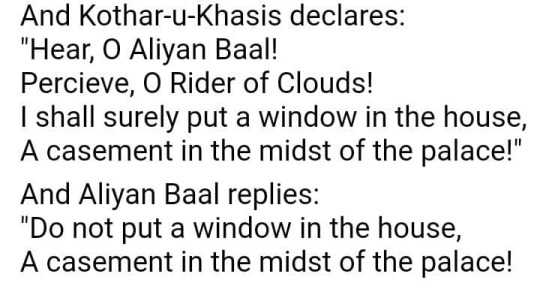
Yam – the god of the sea, also serving as Baal's rival to the throne. Various passage of the myth and other texts portray him as violent, tyrannical and otherwise unpleasant, and his overthrow by Baal as a positive development. He's aided by a number of sea monsters, the most notable of which is the serpent Lotan. It has been argued that that the later Babylonian Tiamat was in part based on him or his counterparts, as she doesn't appear in any Babylonian sources earlier than Enuma Elish, which is a work younger by a few centuries than the Baal cycle.
Mot – a personification of death and desolation. While even Yam received some reverence and offerings, Mot did not – he only existed as an antagonist for heroic figures. Mot's main trait is his insatiable hunger.
While the Baal from Ugarit is, due to possessing his own heroic epic, the most famous and probably best researched today, he was by no means the only deity of this sort – most cities in the Levant (and beyond, in other areas settled by the Phoenicians) had their own tutelary gods, often referred to as Baals. Among these, notable examples include:
The Baal of Tyre – Melqart served as the lead deity of the city of Tyre, seemingly the most prominent of the Phoenician centers. His name seems to simply mean “lord of the city”. He was a god of many things, most notably being viewed as a culture hero who discovered the secret of producing the purple dye which made Phoenician city-states rich and prosperous. He was also an underworld deity, and as a result an association with Babylonian Nergal has been proposed. It's quite likely that the Tyrian Baal was the one mentioned in some Biblical accounts – for example, Jezebel was said to be a princess of Tyre, therefore it's plausible that the god she revered was the Tyrian Baal. Greeks regarded him as analogous to Heracles, sadly I am unable to find the explanation for this.
The Baal of Sidon – Eshmun, a healing deity. He was seemingly viewed as analogous to the Mesopotamian Tammuz, Ishtar's lover condemned to torment in the underworld in her place. The origin of his name is unclear. His myth is somewhat similar to that of Phrygian Attis – the goddess Astronoë (possibly a variant of Astarte/Ishtar) was madly in love with him, but he was, to put it lightly, not interested (unlike Attis), and eventually castrated himself to show that, which lead to his death. He was restored to life (also unlike Attis) and made into a god of healing. Melqart and Eshmun were the two Phoenician gods invoked in a treaty meant to guarantee peace between the coastal regions and Assyria, which shows the high status of their cities in antiquity.
The Baalat of Gebal (Byblos) – Baalat was the feminine form of Baal, and a title sometimes simply applied to any prominent goddess. However, the Baalat of Gebal was seemingly a separate deity, associated with this epithet in the same way as Ugarit's Hadad became inseparable from his title of Baal. Some researchers instead propose she was simply Ashtart/Astarte, though Anat, Asherah, and Egyptian Isis and Hathor (while Ugarit was a Hittite or Mittani vassal, Gebal was under Egyptian control) were also proposed as her true identity based on instances of historical syncretism. However, due to very few surviving documents, her exact nature remains puzzling.
Baal Shamin - revered not only by Phoenicians and their ancestors, but also by Nabateans. He was likely initially simply an epithet of Baal Hadad, but developed into a distinct deity in later times. As a separate figure he was the lead god of Palmyra, though he was eventually upstaged by Bel (Marduk) there.
The Baal of Carthage, Hammon - unlike the generally youthful other Baals, he was depicted as an old man. He was also regarded as the father of Melqart, with the latter viewed as a more important deity – Carthage in fact paid tribute to his Tyrian temple. Most of what we know about him comes from Roman sources, and as a result it's hard to tell what was his true nature – it has been proposed he was a sun god at first. He was equated by Greeks with Cronus.
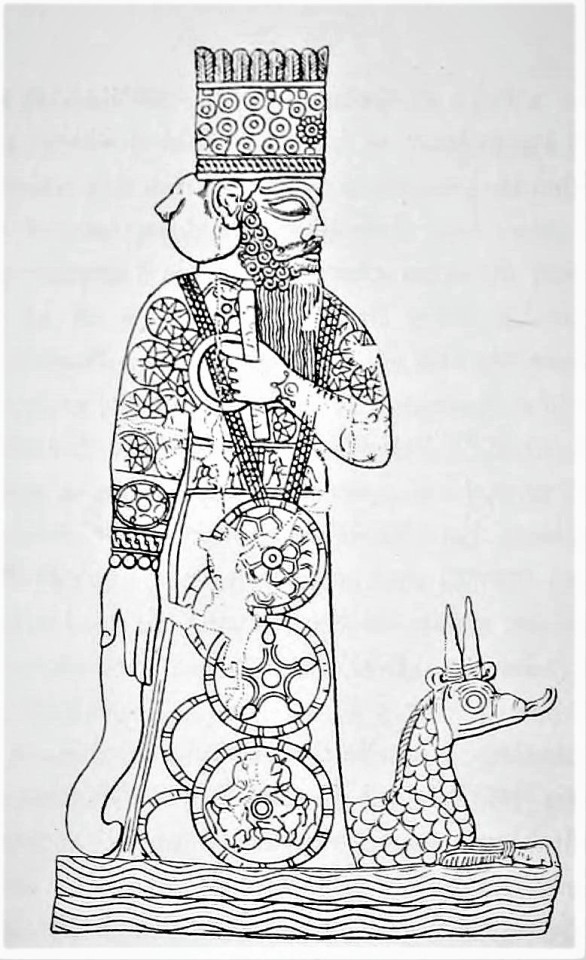
In a way, Babylonian Marduk can be considered to be a Baal – among the titles used to refer to him was “Bel,” the equivalent of “Baal,” and like the coastal Baals he was originally simply the protective deity of a specific city. However, occasional attempts to identify Marduk as originally having roughly the same nature as Adad/Hadad – that of a weather and agriculture god – are generally not considered to be credible by modern researchers. As I already noted, it is however quite likely that Marduk's battle with Tiamat – a figure invented for the Enuma Elish – was at least in part based on Baal's fight with Yam in the Baal cycle. Sadly, the dubious claims that Tiamat represents a deposed matriarchal order seem to be much more known to the general public – as I already said on my blog before, these are nonsensical and their spread relies on limited understanding of Mesopotamian history. Enuma Elish was not a primordial text, but a myth devised relatively late to further help with increasing Marduk's status by having him perform the same acts as many other popular gods, there is also no evidence of the existence of an earlier matriarchal religion in Sumerian and Akkadian sources. Curiously, it's also possible the myth of Baal and its analogs and derivatives inspired Zeus' battle with Typhon – it is sometimes said that it took place near mount Saphon, associated with the cult of Baal Hadad and specifically with his battle against Yam.

Egyptians regarded Baal as analogous to Seth – this conflation occurred before Seth's dominant role became that of an opponent of Osiris of his family, and relied on Seth being a god of the borderlands and foreigners inhabiting them, as well as on his chaotic, impulsive nature. Possibly depictions of Seth as the opponents of the serpent Apep were a factor, too. In an Egyptian adaptation of the Ugaritic Baal cycle, the so-called Astarte papyrus, Seth battles Yam, though no outright conflation of the Ugaritic and Egyptian mythical evildoers ever occurred to my knowledge. Baal's supporting cast of Anat and Astarte was likewise associated with Seth in Egypt, and both are referred to as his consorts in Egyptian texts. Outside of this specific example of syncretism, “Seth” was also sometimes used as a generic title for foreign gods, almost the same was as Baal functioned as a title in the Levant – it was applied to various Canaanite gods, but also to the gods of the Hittites. For example the peace treaty between Ramses II and Hattusili XI mentions “Seth of the city of Zipalanda” and “Seth of the city of Arinna” - corresponding Hittite text reveals that these are simply Teshub, the Hurrian an Hittite monster-slaying thunder god (and close analog of Ugaritic Baal Hadad – as Ugarit was seemingly at least for some time a Hittite dependency, it is more than likely their myths influenced each other), and the sun goddess of Arinna. Egyptians referred to the Libyan god Ash as a Seth, too. Curiously, at least one Ugaritic text identifies the city's Baal with Amun, rather than Seth – it doesn't seem like this idea caught on in Egypt, though.
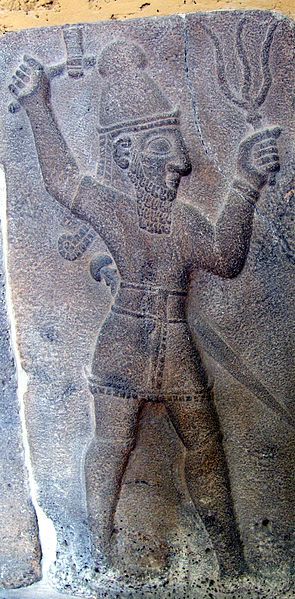
Teshub was possibly the deity closest to Baal Hadad both in terms of myths and depictions – compare the one above with the Ugaritic Baal stele from much earlier in this article – but as a little known figure he (and his most notable allies and enemies) deserves his separate post, so I will not discuss him there, beyond letting you know that while Baal simply clobbered Yam with some encouragement from friends, Teshub only managed to best the serpent monster Illuyanka by having his son seduce Illuyanka's daughter in order to recover his internal organs stolen by the snake. Even functionally similar deities can have wildly different stories behind them! Further reading (most articles available on academia edu, jstor or persee):
A Moratorium on God Mergers? The Case of El and Milkom in the Ammonite Onomasticon by Collin Cornell
Animal sacrifice at Ugarit by Dennis Perdee
The Lady of the Titles: The Lady of Byblos and the Search for her "True Name” by Anna Elise Zernecke
Ugaritic monsters I: The ˁatūku “Bound One” and its Sumerian parallels by Madadh Richey
‛Athtart in Late Bronze Age Syrian Texts by Mark S. Smith
ʿAthtartu’s Incantations and the Use of Divine Names as Weapons by Theodore J. Lewis
Baal, Son of Dagan: In Search of Baal’s Double Paternity by Noga Ayali-Darshan
The Role of Aštabi in the Song of Ullikummi and the Eastern Mediterranean “Failed God” Stories by Noga Ayali-Darshan
The Death of Mot and his Resurrection in the Light of Egyptian Sources by Noga Ayali-Darshan
The Other Version of the Story of the Storm-god’s Combat with the Sea in the Light of Egyptian, Ugaritic, and Hurro-Hittite Texts by Noga Ayali-Darshan
The storm-gods of ancient Near East: summary, synthesis, recent studies, parts 1 and 2 by Daniel Schwemer
Politics and Time in the Baal Cycle by Aaron Tugendhaft
Echoes of the Baal Cycle in a Safaito-Hismaic Inscription by Ahmad Al-Jallad
My neighbor's god: Assur in Babylonia and Marduk in Assyria by Grant Frame
Gods in translation. Dynamics of transculturality between Egypt and Byblos in the III millennium BC by Angelo Colonna
Zeus Kasios or the Interpretatio Graeca of Baal Saphon in Ptolemaic Egypt by Alexandra Diez de Oliveira
173 notes
·
View notes